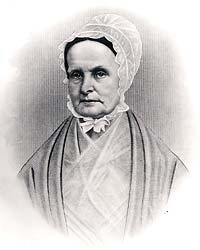World Anti-Slavery Convention & Lucretia Mott

Courtesy of the American Antiquarian Society
Lucretia Mott (1793-1880), a well-known Quaker preacher and independent thinker. Her experience and leadership was invaluable in helping to organize the woman’s rights movement. She founded the Philadelphia Female Anti-Slavery Society in 1833 and led the delegation of women to the 1840 World Anti-Slavery Convention held in London. The female delegates representing the American Anti-Slavery Society were denied participation because of their gender. Mott kept a diary of the experience.
Charles C. Burleigh wrote from Philadelphia, PA to Abby Kelley, c/o S. S. Cowles of Hartford, CT on August 27, 1840 to support Abby “in your present rugged & rocky field of labor... because I want to bid you God speed in your self-denying exertions in behalf of human rights.” He poetically describes visions that encourage him then gave the reader insight into the developing Woman question—should women be allowed to participate equally with men in the abolitionist organization?
“And the great ‘World’s Convention’ has come + gone—or rather has never come. What a pity there was so much of a narrow + illiberal spirit in the gather- ing.” Referencing a letter from Lucretia Mott on the subject, he asks, “What did you think though, Abby, of H. B. Stanton’s voting with our friends on the Woman questions? By the way, I learn that his wife [Elizabeth Cady Stanton] appears to be a very independently thinking person, + our Philadelphians speak of her in strongly favorable terms. I hope she may exert a good influence over him.”
(Abby Kelley, Stephen and Alla Foster Letter Collection, 2004.05.1, Worcester Historical Museum)
An attempt to correct this type of gender bias was made eight years later during a visit to Seneca Falls, NY where Mott helped Elizabeth Cady Stanton organize the first woman’s rights convention.
On December 17, 1849 Mott wrote her Discourse on Women.
Mott played a key role at the National Woman’s Rights Conventions that followed beginning in 1850 in Worcester, MA.
Educational Resources
“Eighth annual meeting of the Massachusetts Anti-Slavery Society”, The Liberator, 31 January 1840. .
“How Did Lucretia Mott Combine Her Commitments to Antislavery and Women's Rights, 1840-1860?” Women and Social Movements in the United States, 1600-2000.

